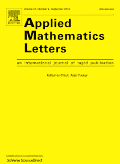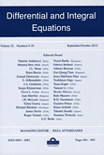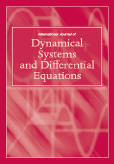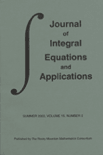
DIFFERENTIAL EQUATIONS
Scope & Guideline
Bridging Gaps in Mathematical Theory and Practice
Introduction
Aims and Scopes
- Existence and Uniqueness Theorems:
The journal frequently publishes studies that establish existence and uniqueness results for solutions of various types of differential equations, including ordinary, partial, and stochastic differential equations. - Stability Analysis:
A significant focus is on the stability of solutions to differential equations, where researchers develop methods to analyze and guarantee stability in various contexts, such as nonlinear systems and stochastic models. - Control Theory Applications:
Many papers explore the application of control theory to differential equations, addressing feedback control, optimal control problems, and stabilization techniques for both linear and nonlinear systems. - Numerical Methods and Approximations:
The journal includes contributions on numerical methods for solving differential equations, including finite difference, finite element, and spectral methods, reflecting the importance of computational approaches in the field. - Nonlinear Dynamics and Bifurcation Theory:
Research on nonlinear dynamics, including bifurcation phenomena and chaos in differential systems, is a prominent theme, exploring complex behaviors arising from simple differential equations. - Integro-Differential Equations:
Papers that deal with integro-differential equations are also common, often highlighting their applications in physics and engineering, as well as their mathematical properties. - Fractional Differential Equations:
The journal has seen an increase in research focused on fractional differential equations, which generalize classical derivatives and are applicable in various fields such as viscoelasticity and control theory.
Trending and Emerging
- Stochastic Differential Equations:
There is a significant increase in research on stochastic differential equations, particularly those driven by fractional Brownian motions, highlighting their relevance in modeling real-world phenomena with inherent uncertainty. - Hybrid Systems and Control,:
Emerging interest in hybrid systems, which combine continuous and discrete dynamics, is evident. This trend is accompanied by studies on their controllability and stability, reflecting the complexities of modern engineering applications. - Nonlinear Dynamics and Chaos Theory:
An upsurge in research exploring nonlinear dynamics and chaos theory indicates a growing interest in understanding complex behavior in differential systems, particularly in ecological and biological applications. - Fractional Calculus:
The application of fractional calculus in various contexts has gained momentum, with researchers exploring its implications in modeling real-world processes that exhibit memory and hereditary properties. - Optimization Problems in Control Theory:
There is a notable trend towards optimization problems in control theory, emphasizing the search for optimal feedback strategies and the application of variational methods to enhance system performance. - Multi-Scale Modeling:
Research on multi-scale modeling approaches, particularly those integrating differential equations across different scales, is emerging, reflecting the need to address complex phenomena in materials science and biology.
Declining or Waning
- Linear Differential Equations:
There appears to be a shift away from purely theoretical studies of linear differential equations, as the community increasingly focuses on nonlinear systems and their complex behaviors. - Classical Solutions:
Research emphasizing classical solutions to boundary value problems has reduced, as newer methodologies and numerical approaches gain traction in the literature. - Deterministic Models with No Stochastic Elements:
There is a noticeable decline in deterministic models that do not incorporate stochastic elements, likely due to the growing interest in stochastic differential equations and their applications. - Single-Domain Problems:
Studies focusing solely on single-domain problems without considering multi-domain or interface effects are less prevalent, as interdisciplinary research increasingly addresses complex systems across multiple domains.
Similar Journals

Applied Mathematics Letters
Empowering Research Through Applied Mathematics ExcellenceApplied Mathematics Letters is a prestigious journal dedicated to the dissemination of significant research in the field of applied mathematics. Published by PERGAMON-ELSEVIER SCIENCE LTD in the United Kingdom, this journal serves as a vital resource for researchers, professionals, and students alike, aiming to bridge theoretical findings and practical applications. With an impressive impact factor placing it in the Q1 category and ranked 33 out of 635 in the Applied Mathematics category by Scopus, it showcases influential articles that contribute to advancements across various applications of mathematics. The journal's coverage from 1988 to 2025 ensures a rich archive of research that remains relevant and insightful for contemporary studies. Currently, it operates under a subscription-based model, providing access to cutting-edge research that forms the backbone of mathematical application in science and engineering. To become part of this dynamic community of scholars, readers are encouraged to explore the latest findings and ongoing discussions that highlight the interplay between mathematics and its real-world impacts.

COMMUNICATIONS ON PURE AND APPLIED ANALYSIS
Pioneering Research in Analysis and Its ApplicationsCOMMUNICATIONS ON PURE AND APPLIED ANALYSIS, published by the American Institute of Mathematical Sciences (AIMS), is a pivotal journal that serves the fields of pure and applied mathematics. With an ISSN of 1534-0392 and an E-ISSN of 1553-5258, this journal showcases rigorous research findings that span a myriad of topics within mathematical analysis and its applications. Given its impressive Q2 ranking in both Analysis and Applied Mathematics categories, it is recognized for its significant contributions, ranking 92nd out of 193 in Analysis and 369th out of 635 in Applied Mathematics according to Scopus. The journal, running continuously from 2004 to 2024, invites submissions that push the boundaries of mathematical thought and practice. While it operates under a traditional access model, the journal's comprehensive scope and burgeoning impact factor underscore its importance for researchers, professionals, and students who seek to engage deeply with current mathematical advancements.

Differential and Integral Equations
Unraveling Complex Equations for Scientific ProgressDifferential and Integral Equations is a renowned peer-reviewed journal published by KHAYYAM PUBL CO INC, focusing on the rich and expanding field of mathematical analysis and applied mathematics. With its ISSN 0893-4983, this journal serves as a critical platform for disseminating innovative research, particularly in the areas of differential and integral equation theory and its applications across various scientific disciplines. Maintaining a significant presence in the academic community, it ranks in the Q2 category for both Analysis and Applied Mathematics as of 2023, highlighting its impact and relevance. The journal's indexed rankings place it at the 67th percentile in Mathematics - Analysis and the 54th percentile in Mathematics - Applied Mathematics, further establishing it as a valued resource for emerging researchers and established professionals alike. Although open access is not currently available, the journal remains crucial for those seeking to contribute to and stay informed on advancements in differential equations and their applications, with converged publication years from 1988 to 1995, 2009 to 2014, and continuing through 2016 to 2024. Researchers, professionals, and students will find that this journal provides essential insights and fosters collaboration within the dynamic mathematical community.

Evolution Equations and Control Theory
Driving Innovation through Rigorous Mathematical Insights.Evolution Equations and Control Theory is a prestigious academic journal published by the Amer Institute Mathematical Sciences (AIMS), focusing on the intersection of applied mathematics, control theory, and simulation models. With a commendable track record since its inception in 2012, the journal has quickly established itself as a leading resource for researchers and practitioners in the fields of applied mathematics and control systems, as evidenced by its Q1 ranking in multiple categories for 2023. The journal features rigorous peer-reviewed articles that explore significant theoretical advancements and practical applications in evolution equations and their control. Although it operates under a subscription model, the high impact of research published in this journal, including its Scopus rankings—placing it within the top percentiles in related disciplines—makes it an essential read for those advancing knowledge in this vital area of study. Based in the United States, the journal continues to foster global academic discourse, driving innovation and development in evolving mathematical frameworks.

Journal of Fixed Point Theory and Applications
Driving Discovery in the Heart of Basel's Academic Community.Journal of Fixed Point Theory and Applications is a prestigious academic journal published by SPRINGER BASEL AG, dedicated to advancing research in the fields of applied mathematics, geometry and topology, and modeling and simulation. With an impressive convergence of research spanning from 2007 to 2024, this journal has established itself as a pivotal platform for disseminating innovative findings and theoretical developments. The journal holds a Q2 quartile in multiple mathematics categories, demonstrating its significant impact and standing within the academic community, particularly evident in its Scopus rankings where it is positioned in the 89th percentile for Geometry and Topology. Although it operates without an open access model, the journal's rigorous peer-review process ensures the highest standards of quality, making it an invaluable resource for researchers, professionals, and students seeking to explore the dynamic interactions between fixed point theory and its diverse applications. Set in Basel, Switzerland, the journal embodies an international scope, inviting contributions that push the boundaries of mathematical research.

JOURNAL OF EVOLUTION EQUATIONS
Pioneering insights in mathematical evolution.Welcome to the JOURNAL OF EVOLUTION EQUATIONS, a leading academic journal published by SPRINGER BASEL AG, dedicated to the field of mathematics, with a specific emphasis on the analysis of evolution equations. Since its inception in 2001, this journal has become a central platform for researchers and professionals to disseminate innovative findings and theoretical advancements in the domain. With a commendable Q1 ranking in the category of Mathematics (miscellaneous) and a Scopus position of Rank #24/90, it reflects the esteemed quality and impact of the research it publishes. The journal aims to foster scholarly communication by covering all aspects of evolution equations, including their applications to various fields. While currently not available as an open-access publication, it offers access through various academic institutions, ensuring that high-quality research remains accessible to the scientific community. As it approaches its converged years of publication up to 2024, JOURNAL OF EVOLUTION EQUATIONS continues to be an invaluable resource for anyone seeking to expand their knowledge and understanding in this critical area of mathematical study.

International Journal of Dynamical Systems and Differential Equations
Pioneering Insights into Differential EquationsThe International Journal of Dynamical Systems and Differential Equations, published by INDERSCIENCE ENTERPRISES LTD, is an esteemed academic journal that focuses on the intricate mathematical theories and applications of dynamical systems and differential equations. Established in the United Kingdom, this journal plays a critical role in advancing research within its scope, which includes control optimization, discrete mathematics, and engineering. Despite its recent rankings indicating a Q4 status in Control and Optimization and Discrete Mathematics, along with a Q3 position in Engineering, the journal provides a vital platform for scholars to disseminate their findings and engage with ongoing debates in these fields. Researchers and students alike benefit from the journal's commitment to fostering innovative ideas and methodologies, contributing to the development of mathematical sciences. Although currently not an open-access publication, the journal's archives from 2007 to 2023 include valuable research articles that continue to influence the landscape of mathematical explorations.

Journal of Integral Equations and Applications
Advancing Knowledge in Applied Mathematics.Journal of Integral Equations and Applications, published by the ROCKY MT MATH CONSORTIUM, is a pivotal resource in the field of Applied Mathematics and Numerical Analysis. With its inaugural issue released in 1988, this journal has consistently served as a platform for the dissemination of innovative research and comprehensive reviews pertinent to integral equations and their multifaceted applications. Although the journal currently does not offer an open access option, it boasts a competitive standing with a 2023 Scopus ranking that places it in the Q3 category for both Applied Mathematics and Numerical Analysis, emphasizing its significance among peer publications. The ISSN 0897-3962 and E-ISSN 1938-2626 ensure its accessibility to scholars seeking to advance their understanding in these critical areas. As it strides towards its convergence goals culminating in 2024, the Journal of Integral Equations and Applications remains an essential resource for researchers, professionals, and students eager to explore the theoretical and practical applications of integral equations.

Mediterranean Journal of Mathematics
Empowering the Next Generation of MathematiciansThe Mediterranean Journal of Mathematics, published by SPRINGER BASEL AG, is a prominent platform dedicated to the advancement of mathematical research and education. Since its inception in 2004, this journal has been pivotal in disseminating high-quality research across various fields of mathematics, currently holding a notable Q2 ranking in the miscellaneous mathematics category as of 2023. With its ISSN 1660-5446 and E-ISSN 1660-5454, the journal enjoys a respected position in the academic community, evident by its Scopus rank of 129 out of 399 in General Mathematics, placing it in the 67th percentile. While primarily a subscription-based journal, it remains committed to providing a comprehensive resource for researchers, professionals, and students, fostering dialogue and exploration within the mathematical sciences. The Mediterranean Journal of Mathematics, based in Basel, Switzerland, continues to contribute significantly to the evolution of mathematical theory and practice, marking its relevance as we approach its 20th anniversary in 2024.

Communications in Analysis and Mechanics
Transforming ideas into impactful solutions in applied sciences.Communications in Analysis and Mechanics is a pioneering journal published by the AMER INST MATHEMATICAL SCIENCES (AIMS), dedicated to advancing the fields of mathematics, engineering, and applied sciences. With its recent transition to Open Access in 2023, the journal aims to enhance the dissemination of high-quality research by fostering a collaborative environment for researchers, professionals, and students. Operating from the United States, this journal embraces a broad scope encompassing geometry, optimization, and mechanics, ensuring a comprehensive platform for innovation and critical discourse. Despite its nascent status, it features competitive Scopus rankings in various disciplines, notably achieving a percentile around 7th to 13th, indicative of its growing impact among peers. The editorial team is committed to publishing original research that addresses significant challenges and developments within the mathematical sciences, facilitating a vital exchange of ideas and methodologies.